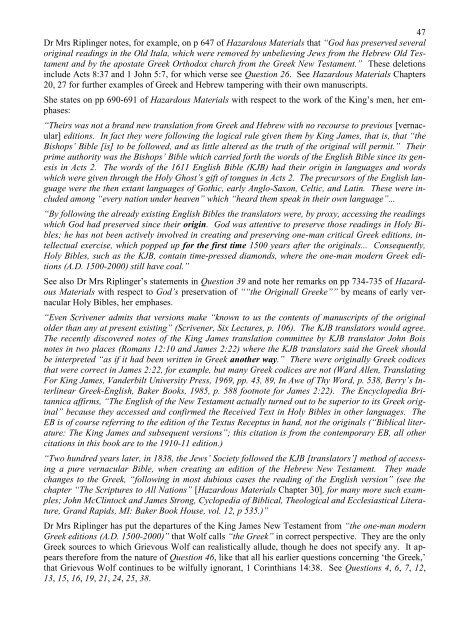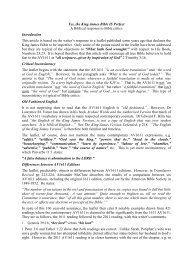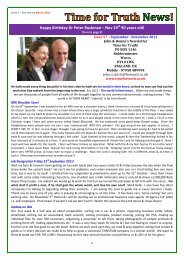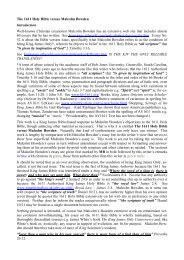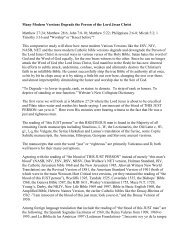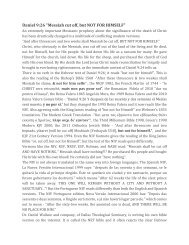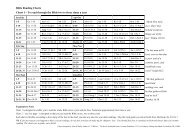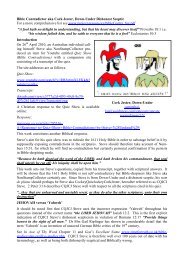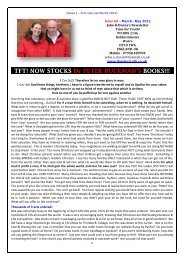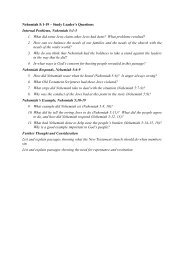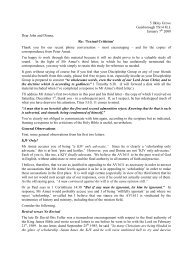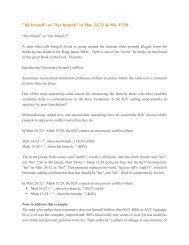A Grievous Wolf - Time for Truth
A Grievous Wolf - Time for Truth
A Grievous Wolf - Time for Truth
You also want an ePaper? Increase the reach of your titles
YUMPU automatically turns print PDFs into web optimized ePapers that Google loves.
47<br />
Dr Mrs Riplinger notes, <strong>for</strong> example, on p 647 of Hazardous Materials that “God has preserved several<br />
original readings in the Old Itala, which were removed by unbelieving Jews from the Hebrew Old Testament<br />
and by the apostate Greek Orthodox church from the Greek New Testament.” These deletions<br />
include Acts 8:37 and 1 John 5:7, <strong>for</strong> which verse see Question 26. See Hazardous Materials Chapters<br />
20, 27 <strong>for</strong> further examples of Greek and Hebrew tampering with their own manuscripts.<br />
She states on pp 690-691 of Hazardous Materials with respect to the work of the King’s men, her emphases:<br />
“Theirs was not a brand new translation from Greek and Hebrew with no recourse to previous [vernacular]<br />
editions. In fact they were following the logical rule given them by King James, that is, that “the<br />
Bishops’ Bible [is] to be followed, and as little altered as the truth of the original will permit.” Their<br />
prime authority was the Bishops’ Bible which carried <strong>for</strong>th the words of the English Bible since its genesis<br />
in Acts 2. The words of the 1611 English Bible (KJB) had their origin in languages and words<br />
which were given through the Holy Ghost’s gift of tongues in Acts 2. The precursors of the English language<br />
were the then extant languages of Gothic, early Anglo-Saxon, Celtic, and Latin. These were included<br />
among “every nation under heaven” which “heard them speak in their own language”...<br />
“By following the already existing English Bibles the translators were, by proxy, accessing the readings<br />
which God had preserved since their origin. God was attentive to preserve those readings in Holy Bibles;<br />
he has not been actively involved in creating and preserving one-man critical Greek editions, intellectual<br />
exercise, which popped up <strong>for</strong> the first time 1500 years after the originals... Consequently,<br />
Holy Bibles, such as the KJB, contain time-pressed diamonds, where the one-man modern Greek editions<br />
(A.D. 1500-2000) still have coal.”<br />
See also Dr Mrs Riplinger’s statements in Question 39 and note her remarks on pp 734-735 of Hazardous<br />
Materials with respect to God’s preservation of ““the Originall Greeke”” by means of early vernacular<br />
Holy Bibles, her emphases.<br />
“Even Scrivener admits that versions make “known to us the contents of manuscripts of the original<br />
older than any at present existing” (Scrivener, Six Lectures, p. 106). The KJB translators would agree.<br />
The recently discovered notes of the King James translation committee by KJB translator John Bois<br />
notes in two places (Romans 12:10 and James 2:22) where the KJB translators said the Greek should<br />
be interpreted “as if it had been written in Greek another way.” There were originally Greek codices<br />
that were correct in James 2:22, <strong>for</strong> example, but many Greek codices are not (Ward Allen, Translating<br />
For King James, Vanderbilt University Press, 1969, pp. 43, 89, In Awe of Thy Word, p. 538, Berry’s Interlinear<br />
Greek-English, Baker Books, 1985, p. 588 footnote <strong>for</strong> James 2:22). The Encyclopedia Britannica<br />
affirms, “The English of the New Testament actually turned out to be superior to its Greek original”<br />
because they accessed and confirmed the Received Text in Holy Bibles in other languages. The<br />
EB is of course referring to the edition of the Textus Receptus in hand, not the originals (“Biblical literature:<br />
The King James and subsequent versions”; this citation is from the contemporary EB, all other<br />
citations in this book are to the 1910-11 edition.)<br />
“Two hundred years later, in 1838, the Jews’ Society followed the KJB [translators’] method of accessing<br />
a pure vernacular Bible, when creating an edition of the Hebrew New Testament. They made<br />
changes to the Greek, “following in most dubious cases the reading of the English version” (see the<br />
chapter “The Scriptures to All Nations” [Hazardous Materials Chapter 30], <strong>for</strong> many more such examples;<br />
John McClintock and James Strong, Cyclopedia of Biblical, Theological and Ecclesiastical Literature,<br />
Grand Rapids, MI: Baker Book House, vol. 12, p 535.)”<br />
Dr Mrs Riplinger has put the departures of the King James New Testament from “the one-man modern<br />
Greek editions (A.D. 1500-2000)” that <strong>Wolf</strong> calls “the Greek” in correct perspective. They are the only<br />
Greek sources to which <strong>Grievous</strong> <strong>Wolf</strong> can realistically allude, though he does not specify any. It appears<br />
there<strong>for</strong>e from the nature of Question 46, like that all his earlier questions concerning ‘the Greek,’<br />
that <strong>Grievous</strong> <strong>Wolf</strong> continues to be wilfully ignorant, 1 Corinthians 14:38. See Questions 4, 6, 7, 12,<br />
13, 15, 16, 19, 21, 24, 25, 38.


